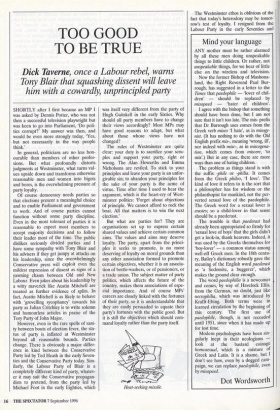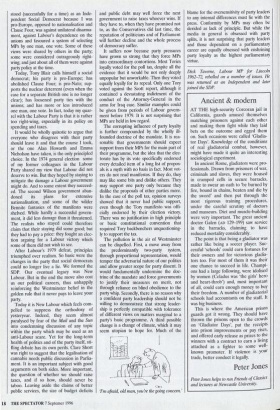TOO GOOD TO BE TRUE
Dick Taverne, once a Labour rebel, warns Tony Blair that squashing dissent will leave him with a cowardly, unprincipled party
SHORTLY after I first became an MP I was asked by Dennis Potter, who was not then a successful television playwright but was keen to go into Parliament, `Do poli- tics corrupt?' My answer was then, and would be even more strongly today, 'Yes, but not necessarily in the way people think.'
In general, politicians are no less hon- ourable than members of other profes- sions. But what profoundly distorts judgments at Westminster, what turns val- ues upside down and transforms otherwise reasonable men and women into bigots and bores, is the overwhelming pressure of party loyalty.
Of course democracy needs parties so that elections present a meaningful choice and to enable Parliament and government to work. And of course parties cannot function without some party discipline. Even in the most tolerant of parties it is reasonable to expect most members to accept majority decisions and to follow their leader most of the time. The public dislikes seriously divided parties and I have some sympathy with Tony Blair and his advisers if they get jumpy at attacks on his leadership, since the overwhelmingly Conservative press will exploit even the mildest expression of dissent as signs of a yawning chasm between Old and New Labour. Even jokes about his leadership by a witty maverick like Austin Mitchell are treated as further evidence of splits. In fact, Austin Mitchell is as likely to behave with 'grovelling sycophancy' towards his party as Julian Critchley is to write solemn and humourless articles in praise of the Tory Party of John Major.
However, even in the rare spells of sani- ty between bouts of election fever, the sta- tus of party is inflated at Westminster beyond all reasonable bounds. Parties change. There is obviously a major differ- ence in kind between the Conservative Party led by Ted Heath in the early Seven- ties and the Conservative Party today. Sim- ilarly, the Labour Party of Blair is a completely different kind of party, whatev- er it may suit the Conservative propagan- dists to pretend, from the party led by Michael Foot in the early Eighties, which was itself very different from the party of Hugh Gaitskell in the early Sixties. Why should all party members have to change their views accordingly? Most MPs may have good reasons to adapt, but what about those whose views have not changed?
The rules of Westminster are quite clear: your duty is to sacrifice your scru- ples and support your party, right or wrong. The Alan Howarths and Emma Nicholsons are reviled. To stick to your principles and leave your party is an unfor- givable sin; to abandon your principles for the sake of your party is the acme of virtue. Time after time I used to hear the argument, which is the heart-cry of West- minster politics: 'Forget about objections of principle. We cannot afford to rock the boat. All that matters is to win the next election.'
But what are parties for? They are organisations set up to express certain shared values and achieve certain common aims. The values and aims may deserve loyalty. The party, apart from the princi- ples it seeks to promote, is no more deserving of loyalty on moral grounds than any other association formed to promote certain objectives, whether it is an associa- tion of bottle-washers, or of pensioners, or a trade union. The subject matter of party politics, which affects the future of the country, makes them associations of espe- cial importance. And of course MPs' careers are closely linked with the fortunes of their party, so it is understandable that they are easily persuaded to equate their party's fortunes with the public good. But it is still the objectives which should com- mand loyalty rather than the party itself.
Heat-seeking missile. The Westminster ethos is oblivious of the fact that today's heterodoxy may be tomor- row's test of loyalty. I resigned from the Labour Party in the early Seventies and stood (successfully for a time) as an Inde- pendent Social Democrat because I was pro-Europe, opposed to nationalisation and Clank Four, was against unilateral disarma- ment, against Labour's dependence on the unions and favoured a system of selecting MPs by one man, one vote. Some of these views were shared by others in the party; some were considered outrageously right- wing; and just about all of them were against party policy at the time.
Today, Tony Blair calls himself a social democrat; his party is pro-Europe; has abolished Clause Four; is pro-Nato; sup- ports the nuclear deterrent (even when the case for a separate British one is no longer clear); has loosened party ties with the unions; and has more or less introduced one man, one vote. In fact, today my quar- rel with the Labour Party is that it is rather too right-wing, especially in its policy on spending and taxes.
It would be wholly quixotic to argue that everyone who disagrees with their party should leave it and that the course I took, or the one Alan Howarth and Emma Nicholson have taken, is the only principled choice. In the 1974 general election some of my former colleagues in the Labour Party shared my view that Labour did not deserve to win. But they hoped by staying to mitigate the damage a Labour government might do. And to some extent they succeed- ed. The second Wilson government aban- doned its plans for extensive nationalisation, and some of the wilder Bennite fantasies of the manifesto were shelved. While hardly a successful govern- ment, it did less damage than it threatened. The realists who stayed could therefore claim that their staying did some good; but they had to pay a price: they fought an elec- tion arguing for a Labour victory which some of them did not wish to see.
After Labour's 1979 defeat, principles triumphed over realism. So basic were the changes in the party that social democrats could no longer live a lie. We formed the SDP. Our eventual legacy was New Labour. But in the end the move also cost us our political careers, thus unhappily reinforcing the Westminster belief in the golden rule that it never pays to leave your party.
Today it is New Labour which feels com- pelled to suppress the orthodoxy of yesteryear. Indeed, they seem almost paralysed by fear of the Mail and the Sun into condemning discussion of any topic within the party which may be used as an anti-Labour scare. Yet for the long-term health of politics and of the party itself, sti- fling debate has its own perils. Clare Short was right to suggest that the legalisation of cannabis needs public discussion in Parlia- ment. It is an important subject with good arguments on both sides. More important, the question of whether we should raise taxes, and if so how, should never be taboo. Leaving aside the claims of better public services, the size of budget deficits and public debt may well force the next government to raise taxes whoever wins. If they have to, when they have promised not to, as the Conservatives did last time, the reputation of politicians and of Parliament will further decline and the whole process of democracy suffer.
It suffers now because party pressures have grown so strong that they force MPs into extraordinary contortions. Most Tories loyally voted for the poll tax, despite all the evidence that it would be not only deeply unpopular but unworkable. Then they voted equally loyally for its repeal. Only one Tory voted against the Scott report, although it contained a devastating indictment of the conduct of the Attorney-General in the arms for Iraq case. Similar examples could be given from periods of Labour govern- ment before 1979. It is not surprising that MPs are held in low regard.
The corrupting influence of party loyalty is further compounded by the wholly ill- founded doctrine of the mandate. It is rea- sonable that governments should expect support from their MPs for the main part of their programme, but the idea that the elec- torate has by its vote specifically endorsed every detailed item of a long list of propos- als is a myth with no basis in fact. Most vot- ers do not read manifestos. If they do, they may like some bits and dislike others. They may support one party only because they dislike the proposals of other parties more. In the case of the poll tax, opinion surveys showed that it never had public support, even though the Tory manifesto was offi- cially endorsed by their election victory. There was no justification in high principle or basic constitutional convention that required Tory backbenchers unquestioning- ly to support the tax.
The pollution in the air of Westminster can be dispelled. First, a move away from the predominantly two-party system, through proportional representation, would temper the adversarial nature of our politics and allow greater scope for party dissent. It would fundamentally undermine the doc- trine of the mandate and force governments to justify their measures on merit, not through reliance on blind obedience to the party whip. Secondly, there is no reason why a confident party leadership should not be willing to demonstrate that strong leader- ship is perfectly compatible with tolerance of different views on matters marginal to a party's basic programme. A third possible change is a change of climate, which it may seem utopian to hope for. Much of the ''m afraid old man, you're the going concern.' blame for the oversensitivity of party leaders to any internal differences must lie with the press. Conformity by MPs may often be derided as lack of principle. But while the media in general is obsessed with party splits, it is not surprising that party leaders and those dependent on a parliamentary career are equally obsessed with enshrining party loyalty as the highest parliamentary virtue.
Dick Taveme Labour MP for Lincoln 1962-72, rebelled on a number of issues. He was returned as an Independent and later joined the SDP.



























































 Previous page
Previous page